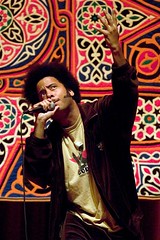Why is it that so-called consciousness-raising hip hop, like that of Boots Riley of The Coup (above), Zion-I, and the Perceptionists, can no longer draw black crowds the way Public Enemy could? While theories abound (read the comments to Kitwana's Village Voice piece), this passage seems interesting:
[Frances Cress] Welsing argued that soon white supremacists wouldn't have to worry about making Blacks seem inferior—they'd just need to keep providing them with inferior education, housing, health care, child care, and the like, and in a generation or two they would be. After 15 years of gangstas and bling, perhaps hip-hop's Black audience has been so inundated with material garbage that they don't want an uplifting message?Strange bedfellows: The GOP has been wooing the hip-hop crowd. Def Jam Records founder (and a frequent critic of Bush) Russell Simmons recently talked with the head of the RNC in a meeting that ended up being so engaging, Simmons blew off a scheduled get-together with Howard Dean.
Zion, who believes the withering Black audience reflects the diminishing discussion of Blackness in public discourse, thinks so. "I do so many shows in front of mostly white audiences that it's the norm," says Zion. "When I get in front of a Black audience it's like, 'Finally you're here, feel me.' We've done shows in Chicago and São Paulo, Brazil, and it feels good to be in front of our people when they are feeling it. But there are some thugged-out crowds where our message doesn't resonate, and Black folks will say that they aren't trying to hear hip-hop artists remind them of their problems."
Today's climate is indeed a far cry from the African medallion mania of the 1980s. In the academy, we've gone from 1980s discussions of Black studies and Afrocentricity to multiculturalism to current-day debates about post-Blackness and polyculturalism. At the same time, in the arena of mainstream politics we've gone from discussing the collective Black impact of Jesse Jackson's run for president to the individual career successes of Clarence Thomas, Colin Powell, and Condoleezza Rice. In the streets we've gone from the Nation of Islam patrolling housing projects to whites reclaiming Harlem, South Side Chicago, and East Oakland, and Black scholars like Columbia University's Lance Freeman arguing that poor Blacks aren't significantly displaced by gentrification.

No comments:
Post a Comment